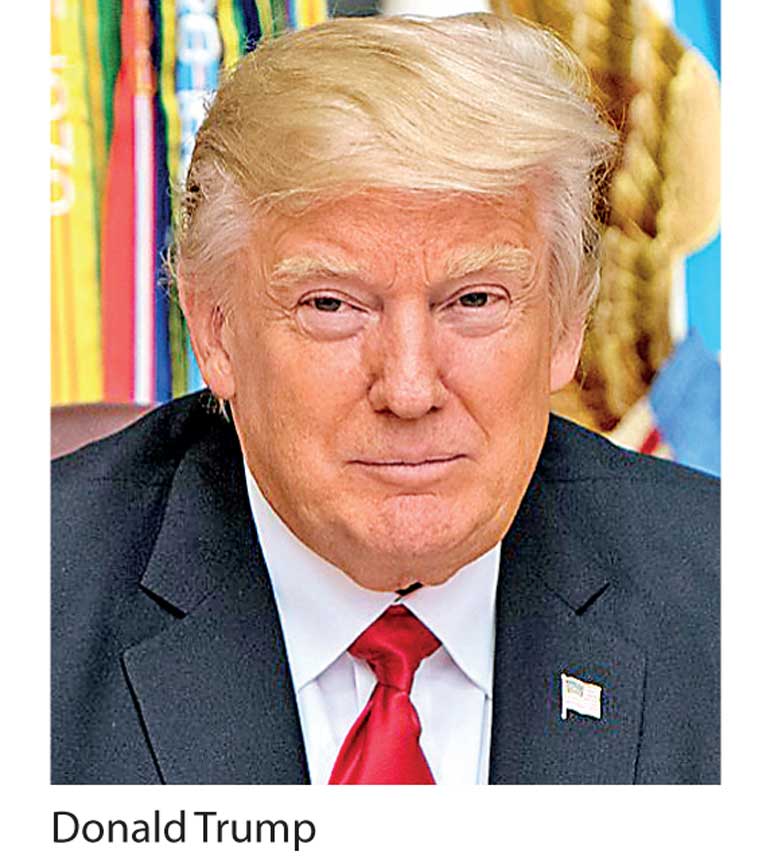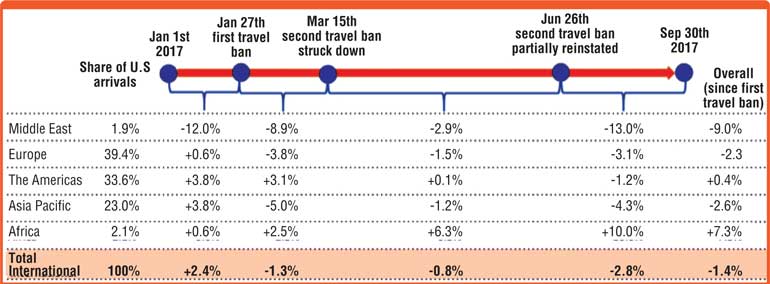Monday Feb 16, 2026
Monday Feb 16, 2026
Wednesday, 18 October 2017 00:00 - - {{hitsCtrl.values.hits}}


International air arrivals in the United States have fallen consistently since President Donald Trump’s original travel ban on people from several mainly Muslim countries, according to the latest data from ForwardKeys which predicts future global travel patterns by analysing more than 17 million booking transactions a day.
The period of decline also coincides with a strengthening US dollar making the States a more expensive destination.
Since January 27 this year when the first controversial travel ban was introduced there has been an overall decline of 1.4% compared to the same period last year, according to ForwardKeys.
The timeline reveals a correlation between the imposition of the first travel ban and the start of a decline in travel to the USA. Meanwhile international arrivals in the rest of the world show an overall increase of 4.6%, climbing consistently over the same period.
The decline in travel to the United States is from around the world – Europe, Asia Pacific and the Middle East. Only travel from elsewhere in the Americas, and Africa (which has a small 2.1% market share of travel to the USA) has shown growth.
Europe – with a 39.4% market share – slumped by 2.3% over the year to the end of September. Asia Pacific – with a 23% market share – was down 3.8%.
ForwardKeys co-founder and CEO, Olivier Jager said: “Our latest detailed findings confirm what our data has been predicting since the first travel ban. There has been a Trump Slump and the strong dollar has compounded it.”
“This must be worrying for the US economy – travel is a huge earner for the United States and relative to the rest of the world, its tourism exports are losing ground.”
“Whilst disappointed for the USA by the latest travel data, we are relieved that the quality of our analysis last April, which was heavily questioned at the time, has been vindicated.”
GREENBELT, Md. (Reuters): A US judge on Monday questioned attorneys defending the Trump administration about a classified report the government is using to justify its latest ban on citizens of some countries from entering the United States.
US District Court Judge Theodore Chuang in Maryland heard arguments for and against President Donald Trump’s new travel ban, set to take effect on Wednesday. It indefinitely limits travel from Iran, Libya, Syria, Yemen, Somalia, Chad and North Korea. Certain government officials from Venezuela were also barred.
All those countries except Chad, North Korea and Venezuela were included in two earlier temporary versions of the travel ban, which Trump’s opponents called thinly veiled attempts to fulfil his campaign pledge of a “total and complete shutdown of Muslims entering the United States.”
Lawyers for advocacy groups including the International Refugee Assistance Project, Iranian Alliances Across Borders and the Council on American-Islamic Relations urged Chuang to block implementation of what critics call Trump’s “Muslim ban.”
Opponents say the ban violates the US Constitution because it discriminates against Muslims while overstepping the bounds of US immigration law by discriminating by nationality. Trump has said the restrictions are needed to tighten security and prevent terrorist attacks.
The third ban came in a Sept. 24 presidential proclamation that Trump issued after acting Homeland Security Secretary Elaine Duke provided him with a classified report recommending the travel restrictions.
Chuang asked Hashim Mooppan, the attorney representing the government, if there were inconsistencies between the homeland security report and Trump’s proclamation. Mooppan declined to discuss details of the classified report, and said the government does not have to explain whether Trump’s advisers disagreed about the ban.
“We stand by the factual representations in the proclamation,” Mooppan said.
On Friday, in a separate case against the ban in Hawaii, the government said the judge can review the classified report only in a secure setting.
Chuang struck down an earlier iteration of the ban, which was only partially restored by the US Supreme Court in June.
An attorney from the American Civil Liberties Union, Omar Jadwat, argued that the new version is a “a bigger, tougher version of the same ban” that Trump originally wanted. Trump could have achieved the same national security goals with “far more targeted measures” similar to the restrictions on Venezuelan government officials, rather than broad bans against certain nationalities, argued Justin Cox, an attorney at the National Immigration Law Center.
Mooppan argued that because the new version of the ban went in place after a thorough review, it does not constitute a “Muslim ban.” The third version of the ban omitted Iraq, which was included in the first ban and Sudan, which was in the second version.
“The proclamation dropped multiple Muslim countries and exempted multiple types of non-immigrant visas even from the Muslim countries,” he said. “That is strong evidence that this is not some kind of Muslim ban in disguise.”
Chuang said he would rule later on whether to grant the challengers’ request for an injunction.